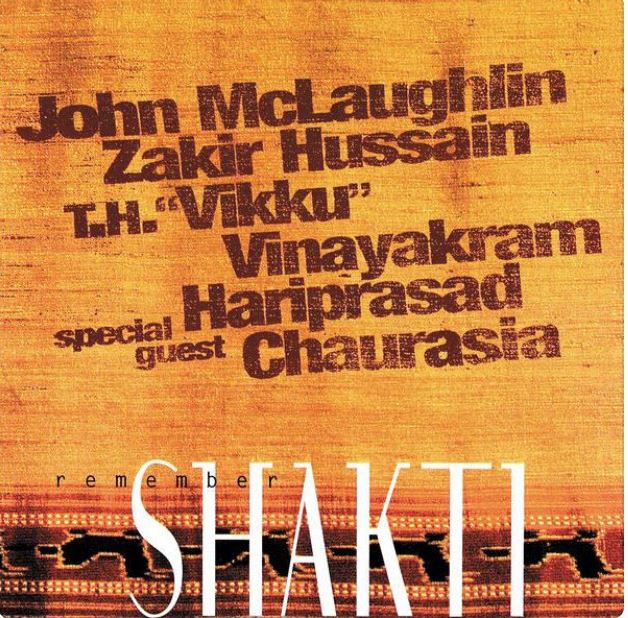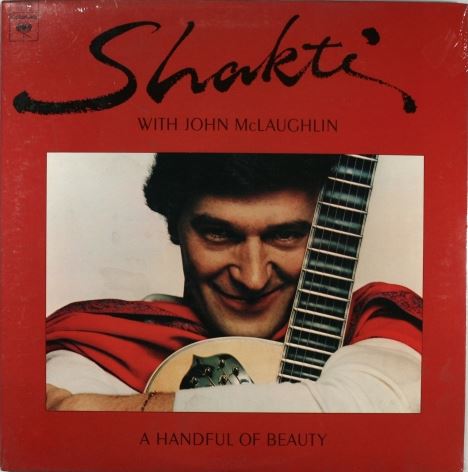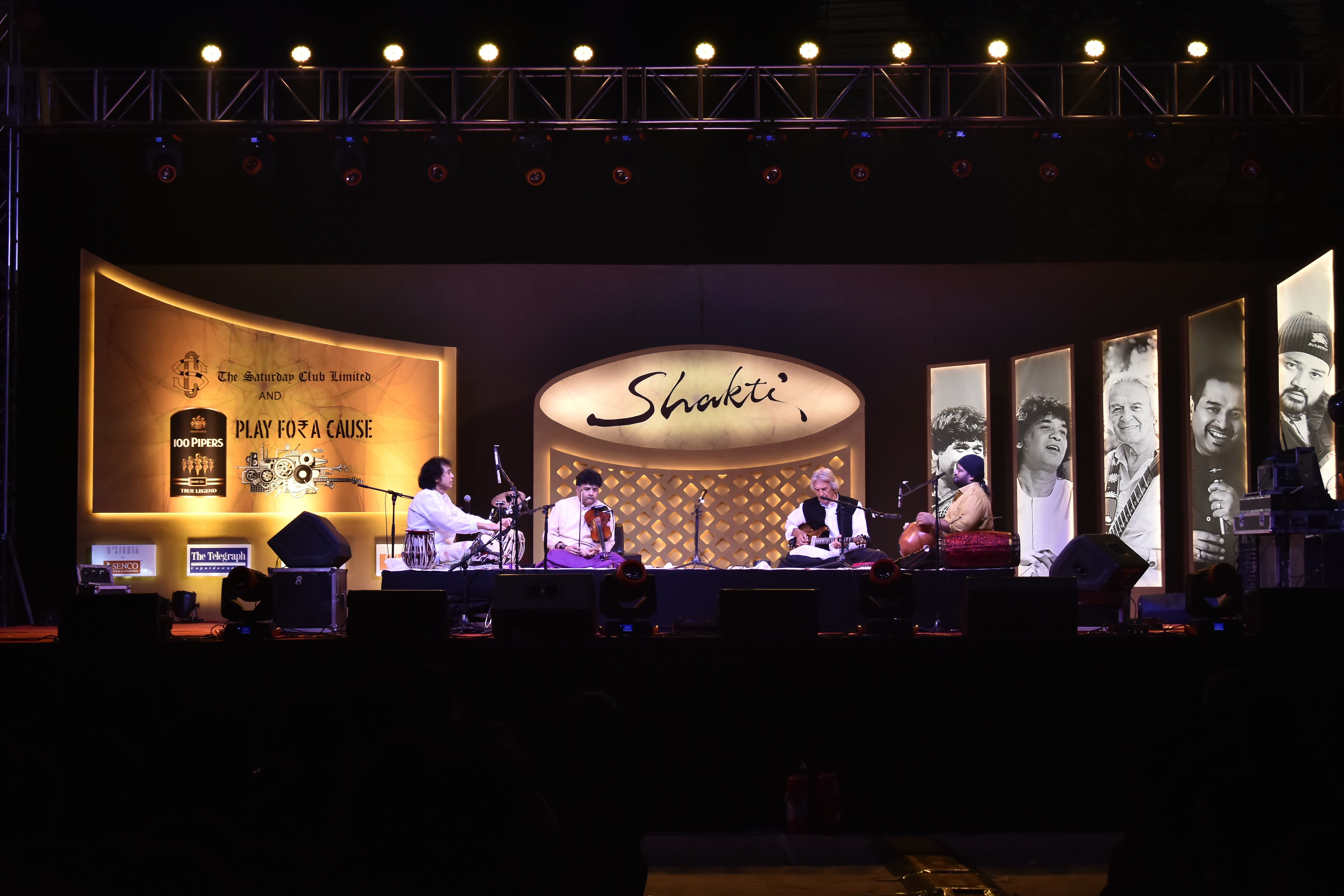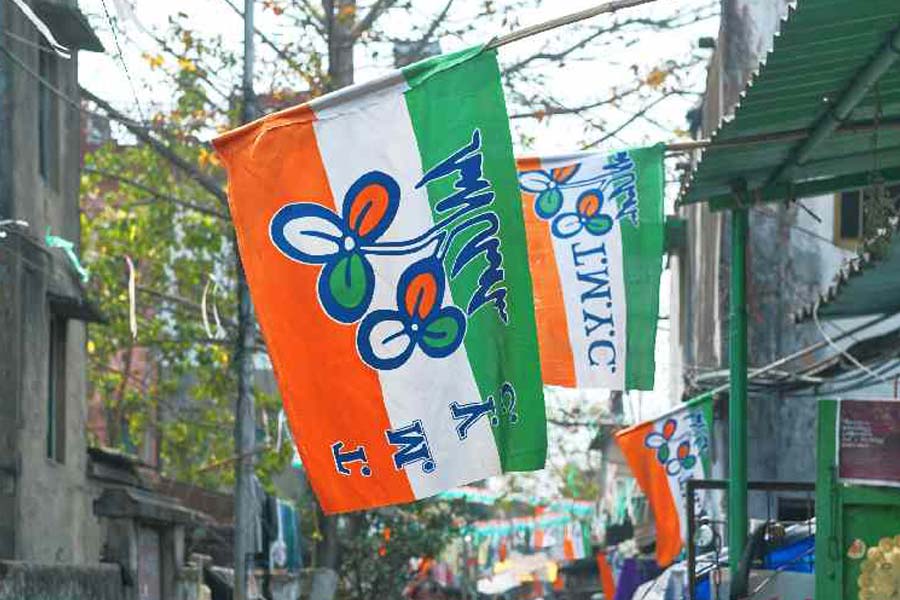India has impacted John McLaughlin so deeply that he says he must have been Indian in some other life. He describes Indian music in absolute terms: inclusive, reflecting every aspect of the human heart and soul. Not surprisingly, therefore, Tuesday’s performance of Shakti, the quartet he founded with Zakir “The Amazing” Hussain, reflected all that and more.
Sir John’s trademark lightning-fast flourishes of the past, when he used a specially designed acoustic guitar with sympathetic strings, were fleeting at the Calcutta concert held at The Saturday Club. From the days of Remember Shakti, a later incarnation of the band, he has been playing electric. Harmonising with a gentle strum here, a nudge there even while squeezing in an intense phrase in-between. He creates space for Ganesh “soulful” Rajagopal to hold forth on the tune and improvise on the violin, while Zakir provides a complex rhythmic framework on which young V. “Chella S” Selvaganesh, the son of the original Shakti ghatam exponent, Vikku Vinayakram, does his magic on the kanjira. Shankar Mahadevan fits in, only he knows how, working his genre-defying vocals through the music and singing the tune. At times, he holds back to ensure his dynamic range doesn’t swamp the music.
Shakti is on song. But it is a fresh song. The opening track, 5 In The Morning, 6 in the Afternoon was enough to tell the audience - over 2,500 - that the music would be intense. Ganesh seemed in meditative form, as though his bow was painting bold brushstrokes on a canvas held up by the soundscape. More tracks, new and old, follow. Bridge of Sighs, Five Piece Band, Anna and Sakhi in which the interlude of the tabla and Selva’s kanjira and ghatam packed a bouncy punch.
Cultural distinctions fade when you hear Shakti that has seen many personnel changes over its 40-year off-and-on existence. The music takes centre stage, showcasing individual dexterity amid complex beat structures, together anchored by Zakir and McLaughlin. The interplay between the musicians has always been the highlight of watching them live. The experience is invigorating even today, even if not as uniformly as it used to be earlier.
It didn’t seem to matter though. Most got what they had come for. Just like the two young medical students, who had flown down for a day from Dhaka for the concert. “We thought this was the best opportunity to catch the legends live,” said a gushing Ishraq Atahar.
For me, Lotus Feet was it, although it did seem to end too soon. This McLaughlin tune of eternal serenity and beauty had Shankar do a neat vocal improvisation. Somehow, it seemed to echo what John McLaughlin spoke about the night before the concert.
“To me, India is Light, Illumination. It holds the answer to the great existential questions. The music of India is absolutely inclusive. It reflects every aspect of the human heart and soul,” he told The Telegraph Online during a brief interaction with the band. Excerpts:
Tell us about your new album, Is that So?
John McLaughlin: It’s founded in the Shakti tradition. But it’s a new form, one that thrills me. It started as an experiment. It was an idea to take improvisation from an Indian classical singer and throwing away the tanpura and harmonising it. Well it’s a bit nutty really, isn’t it?
You have been thinking on such integrations for ages.
Yes. I have been thinking about this for, say, 30 years within the group that has been together, on and off, for over 40 years. My feeling at the very beginning of Shakti was how can I integrate western harmony, which is the only element not included in Indian music, without taking away something. This aspect of the work exists in the improvisation sections of the new album. Have you heard the album?

'Natural Elements' by Shakti. Wikimedia Commons
I have heard one tune, Sakhi.
JM: Yes, Sakhi. Well there are basically two different forms, one where the tonality is gone. Basically, all our traditions went out of the window, including my own, because there is no reference to how a western harmonic progression should move. So, we created our own logic and then with Shankar singing, we found we loved it very much. After working on it we realised we needed improvisation where more of the Shakti tradition became involved and that’s where we were able to invite the marvelous Zakir to play with us. And then after this we go back into the world where all the rules have gone out of the window.
From the very beginning, I have been saying to Shankar, 'You know, I have no idea how western or Indian people will react to this'. But from my point of view I couldn’t care less. Because we both feel very deeply about it and there are some very deep emotions from East and West.
It was your singing that sort of propelled the idea, right?
Shankar Mahadevan: This happened organically. We were anyway touring and we used to keep doing this, experimenting on stage too, like during an introduction to a piece. If the harmony formed the backdrop of a particular melody we used to go somewhere, and try different stuff that is not normal. That used to excite all of us. And then, somehow, we decided to do this. He (McLaughlin) asked me to send him one piece. And I did. Sir (pointing to JM) played and it excited the three of us so much that we decided to keep doing this.
It seems you all really wanted to do this?
SM: At some stage you have to do something you really want to do without caring whether there is some strong hook which will sell a million records, you know? We wanted to communicate something that is very close to our hearts, just put it out there. One piece in the album is just a seven-minute alap. An improvised alap, which he (JM) has completely orchestrated and harmonised.
Sakhi is very uplifting.
JM: I must have listened to it a thousand times. It still makes me laugh and makes me weep, depending on what mood we are in. Now I laugh now I weep.
Zakir Hussain: It goes hand in hand. You can’t have one without the other.
You all straddle various genres of music from rock, jazz and classical to popular music. How do you manage?
Ganesh Rajagopal: For me, sa re ga ma pa dha ni is the language. I see everything in there. That’s how I seem to manage. I feel it is also about how we react to the music we listen to. For me, music always brings out beautiful emotions. These could be different from cultural point of views. But it gives me a high when I am able to communicate that through my language, which is music.
SM: All of us are students at heart. Every day, we are learning new stuff. Something excites us and we feel the need to be associated with it. If it’s an amazing film song or an amazing ghazal, or if it’s Shakti, I want to be associated. If it’s a pure classical concert, I want to be associated. So, I want to learn it, and try it out. All this is an extension of being a student at your core.
Zakir: My approach is that I want to be moulded into the shape of things that are taking place at a particular moment so that I can be in the midst of that. I would love to be a tree in a forest if that’s what I am going to be or I want to be a blade of grass in a field of grass. I want to be able to do that. And to be able to do that means total surrender to that which is taking place. To fall, without any fear, into that whirlpool, become a part of that mix that is going down to whichever depth it is taking you to and throwing you out at the other end with a revelation that would be wondrous, incredible and an education of immense value. So that’s what it is. It’s a mindset that does not hold boundaries, does not close doors. I am not going to bring my tabla and say that I am only going to play the kaidas I learnt from my father or those relas or chhanns that I have learnt from so many other tabla players. If I am going to sit there and say that this is all that I am going to do, then it is a lost cause anyway. I want to be able to be open. I want to be able to play my tabla with my elbow if that’s what it takes to fit into the scheme of things.
But the key is that I have had the grounding for the 18-20 years of my formative years that allows me to have my own identity. So, I am not lost. I can find my way back home. That allows me to move freely into the desert and not worry about where the next waterhole is.
JM: I think it is very simple. If you love it… love makes everything work. I love these musicians. They provoke me, stimulate me, which is what I need in music. And I want to be able to play with these people. Because I love them and I love what they do.
India has been at the heart of your creative process.
JM: India has impacted me for the last 50 years. I think I was Indian in one life. And I think we were connected somehow. To me, India is Light, Illumination. It holds the answer to the great existential questions. The music of India is absolutely inclusive. It reflects every aspect of the human heart and soul.

'Remember Shakti'. Wikimedia Commons

'A Handful of Beauty' by Shakti. Wikimedia Commons










